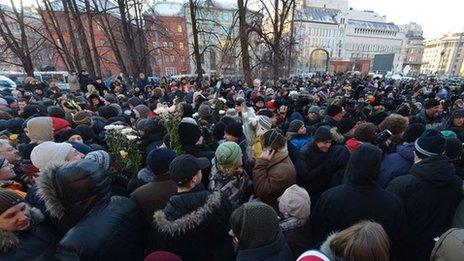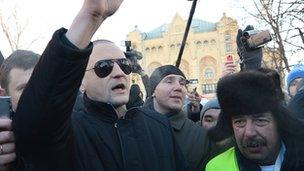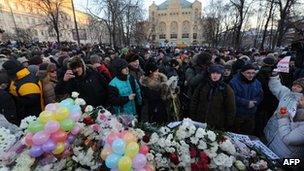Russian opposition leaders arrested at anti-Putin rally
- Published

Hundreds of protesters braved freezing temperatures
Russian police arrested prominent opposition leaders at a rally against President Vladimir Putin in Moscow.
Blogger and activist Alexei Navalny said on Twitter he had been detained at the rally in Lubyanka Square, which was banned by the authorities.
Fellow opposition leaders Ilya Yashin, Ksenia Sobchak and Left Front head Sergei Udaltsov were also arrested.
Police eventually broke up the rally, one of several nationwide that marked a year of protests against Mr Putin.
Mr Navalny later tweeted that he and the other opposition leaders had been released without charge.
In all, 40 people were arrested, police said.
Reports said police cleared the square by moving protesters towards a nearby metro station.
'Raving mad'
Mr Navalny, who has been one of the most vocal anti-Putin campaigners, tweeted: "This is the traditional and not very original tweet from the police detention van.
"It's raving mad. They snatched me out from the crowd."

Opposition leader Sergei Udaltsov was later arrested
There was a large police presence for the rally, which took place in freezing temperatures outside the headquarters of the Federal Security Service, which is the main successor agency of the Soviet KGB.
Police arrested Mr Yashin, a leading figure in the Solidarity movement and TV presenter Ksenia Sobchak as they made their way to the rally.
Mr Yashin confirmed their arrest on Twitter, with a heavy dose of irony.
"Came with Ksenia Sobchak for a stroll on the Lubyanka Square. The police decided we were too cold and put us into a detention van," he wrote.
Legal action
Reuters reported that Mr Udaltsov raised a fist in the air as police grabbed him under the arms and hauled him away into a waiting van.
The BBC's Steven Rosenberg in Moscow said the protesters had gone to place flowers on a small monument in the square to victims of Soviet repression.
They laid flowers not only to honour victims of the past but as a warning that repression is returning, he says.
Opposition "Freedom March" rallies also took place in other Russian cities on Saturday, Interfax news agency reported.

Protesters placed flowers at the Solovetsky Stone memorial in Moscow to victims of Soviet repression
In St Petersburg, more than 25 people were arrested in a protest that had been allowed by city officials, Interfax said.
Other large rallies were reported in Tomsk and Yekaterinburg.
Earlier this week, Mr Putin used his annual state-of-the nation address to suggest that some opposition politicians were being paid by outside, foreign interests.
Legal action against opposition figures has increased markedly since Mr Putin was re-elected to a third term in March.
On Friday, Mr Navalny was charged with fraud and money laundering - the second criminal case against him.
A tough new law has passed on public order offences and tight curbs have been placed on non-governmental organisations.
Last winter saw the biggest anti-government demonstrations in Moscow since the fall of the Soviet Union, with protesters accusing Mr Putin's allies of rigging the parliamentary elections in 2011.
- Published12 December 2012
- Published26 October 2012
- Published14 December 2012